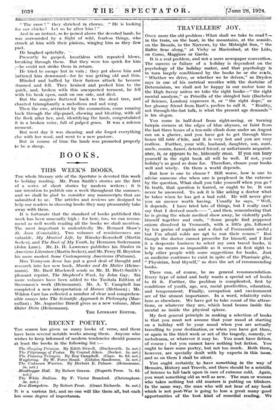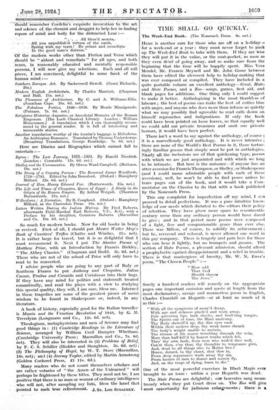TRAVELLERS' JOY.
ONCE more the old problem : What shall we take to read ?— in the train,' on the boat-, in the mountains, at 'the seaside, on the Broads, in the Is.larroWs, by the Midnight Sun, " the Baltic Seas along," at Vichy or Marienbad, at the Lido, on Como„ Maggiore. or Garda.
It is a real problem, and not a mere newspaper convention. The success or failure of a holiday is dependent on 'the psychology of _the holiday maker, and that psychology is in turn largely conditioned by the books he or she reads. " Whether we drive, or whether we be driven," as Dryden says in one of his metrical wrestles with -the doctrine of Determinism, we shall not be happy in our motor tour in the High Savoy unless we take the right booki—" the right mental anodyne," as Priscilla of the shingled hair (Bachelor of Science, London) expresses it, or " the right dope," as her -gloomy friend from Bart's. prefers to call it. " Reality, not through-the-hat talk, is what the present age demands " is his slogan.
You come in half-dead from sight-seeing, or turning hairpin corners at the edges of blue abysses, or faint from the last three hours of a ten-mile climb done under an August sun on a glacier,. and you have got to get through three hours till table d'h6te, and it is very hot and you are very restless. Further, your wife, husband, daughter, son, aunt. uncle, cousin, fiancé, detested friend, or unfortunate acquaint- ance, is, or appears to be, hideously cross. If you can bury yourself in the right book all will be well. If not, your holiday's as good as done for. Therefore, choose your books well and wisely. On them a world depends.
But how is one to choose ? Still worse, how is one to advise someone else when one is -perplexed in the extreme by the question, What shall you take yourself when you go ? In truth, that question is barred, or ought to be. It can never be answered. To ask it is like asking a doctor what he takes when he has got a bad cold. He will never give you an answer worth having. Usually he says, " Well, it depends. I have tried lots of things, but I really can't say that I derived much— ", and then, remembering that he is giving the whole medical show away, he violently pulls himself together and ends, " Some people find peppered onions dissolved in Vermouth, with a little gin, followed by ten grains of aspirin and a dash of Formamint useful ; but I'm afraid colds are apt to run their course." But though the doctor cannot prescribe for himself, and I find it a desperate business to select my own travel books, it is by no means as impossible as it seems at first sight to help other people with some suggestions for books. Just as medicine continues to exist in spite of the Pharisaic gibe, " Physician, heal thyself," so does the art of recommending books.
There can, of course, be no general recommendation. Every type of mind and body wants a special set of books to fit it. Further, the problem is complicated, first by conditions of youth, age, sex, racial proclivities, education, and temperament. Finally, occupation and environment arc of the utmost importance. In a word, relativity rules here as elsewhere. We have got to take count of the attrac- tions, or whatever they are, which bend beams inside the mental as inside the physical sphere.
My first general principle in making a selection of books is that you must not assume that your mood at starting on a holiday will be your mood when you are actually travelling to your destination, or when you have got there, or again in the third week or act of the tragedy, comedy, or melodrama, or whatever it may be. You must have fiction, of course ; but you cannot have nothing but fiction. You ought to have some poetry, but not too much. Both these, however, are specially dealt with by experts in this issue, and so on them I shall be silent:
You ought certairdg tp ;have something in the way of Memoirs, History and Travels, and there should be a scintilla of Science to fall back upon in case of extreme cold: Again, you want something old as well as new. The man -or woman who takes nothing but old masters is putting on blinkers. In the same way, the man who will not hear of any book It is a various list; and no• one will like them all, but eachf which is not post-War is going to lose a great many good has some degree of importance. ' opportunities of the best kind of remedial reading. We Cordelia's-exijuisite iriVadAtibti us-the at and science of the chemist and druggist.to help her in finding repose of mind and body for the distracted Lear :- • '5. , . All bless'd secretsi. - All you unpublish.'d. virtues of the earth, Spring with my, tears,! Be aidant, and reinediate In the good 'man's distress."
Of the Modern works other than Fiction and Verse which should be " aidant and reinediate " for all ages, and both sexes, in reasonably educated and mentally responsible
persons, I will now give my selection& Each and all will
prove, I am convinced,- delightful to some faeet of the human mind :-
Southern Baroque Art. By Sacheverell Sitwell. (Grant Richards. 20s.) Modern. English Architectuie. By Charles Marriott. (Chapman and Hall. 21s. net.)
The Pleasures of Architecture. By C. and A. Williams-Ellis. (Jonathan Cape. 10s. 6d. net.)
The Fabulous Forties, 1840-1850. By Meade Minnigerodo. (Putnam. 7s. 6d. net.)
Scriptores Histories August=' or Anecdotal Memoirs of the Roman Emperors. (The Loeb Classical Library. London : William Heinemann.) A translation which I can thoroughly recom- mend to the general reader. It is full of interesting and memorable stories.
Another translation worthy of the tourist's baggage is Heliodorus. An Aethiopian Romance. Translated by Thomas Underdovvne. (Broadway Translations, George Routledge. 7s. 6d. net.)
Here are Diaries and Biographies which cannot fail to entertain :- Byron : The Last Journey, 1823-1824. By Harold Nieolson. (London : Constable. 12s. 6d. net.)
Shelley and the Unromantic& By Olwen Ward Campbell. (Methuen. 16s. net.) The Diary of a Country Parson : The Reverend James Woodforde, 1758-1781. Edited by John Beresford. (Oxford : Humphrey Milford. 12s. 6d. net.) Journal of Hon. Henry Edward Fox. (Butterworth. 25s. net.) The Life and Times of Cleopatra, Queen of Egypt : A Study in the Origin of the Roman Empire. By Arthur Weigall. (Thornton Butterworth. 21s. net.)
Wilberforce : A Narrative. By R. Coupland. (Oxford : Humphrey Milford, at the Clarendon Press. 16s. net.) Letters Written During the Indian Mutiny. By Fred Roberts, afterwards Field-Marshal Earl Roberts, V.-C., K.G_, with a Preface by his daughter, Countess Roberts. (Macmillan and Co. 108. 6d. net.) So much for modern books. Now for old books in being or revived. First of all, I should put Master Walter Map's Book of Courtiers' Trifles (Chatto and Windus, 21s. net). It is rather large for travel, but it is so delightful that I must recommend it. Next I put The Shorter Poems of Matthew Prior, with an Introduction by Francis Bickley, "The Abbey Classics." (Chapman and Dodd. 8s. 6d. net.)
Those who are not of the school of Prior will only have to read to be converted.
I advise people who are going to any part of Italy or
Southern France to put Anthony and Cleopatra, Julius Caesar, Troilus and Cressida and Coriolanus into their bags. If they have any mind for politics and statecraft treated
romantically, and read the plays with a view to studying this special quality, they will, I am sure, bless me. Interned in these tragedies are some of the greatest pieces of social wisdom to be found in Shakespeare or, indeed, in any literature.
A book of history, especially good for the Italian traveller
is Manin and the Venetian Revolution of 1848, by G. M. Trevelyan (Longmans and Co., 12s. 6d. net).
Theologians, metaphysicians and men of Science may find good things in : (1) Cambridge Readings in the Literature of Science, arranged by William Cecil Dampier Whetham. (Cambridge University Press ; Macmillan and Co., 7s. 6d, net). They will also be interested in (2) Problems of Belief, by F. C. S. Schiller (Hodder and Stoughton, 8s. 6d. net) ; (8) The Philosophy. of Hegel, by W. T. Stace (Macmillan, 18s. net); and (4) Jeremy Taylor, edited by Martin Armstrong (Golden Cockerel Press, £1 1 ls. 6d.).
Many readers who do not count themselves scholars and are rather votaries of " the Amen of the Unlearned " will
perhaps be frightened by these titles. They-need not be. I am positive that there is no man or woman of ordinary intelligence who will not after sampling my lists, bless the hand that pointed to such true refreshment. J. Sr. Lou STR.&CREY.















































 Previous page
Previous page